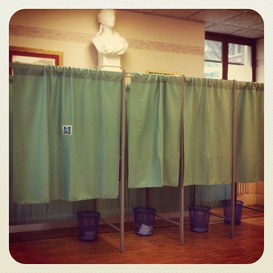
Not long ago, the popular solution to lagging voter turnout was to make the process as easy as possible. In the 1990s, Congress passed a motor-voter law, allowing people to register to vote as they registered their cars. The joke was that fast-food drive-up windows were next.
“What type of sauce would you like? And would you like to super-size it by activating your democratic franchise as an American citizen?”
| | We haven’t completely escaped that trend. In many places, including Utah, Election Day has been elongated to include several weeks, and the computer age is bound to continue opening up new convenient ways to participate. Not all of these are bad innovations. The goal should be to encourage informed voting, not just easy voting, but there is nothing inherently wrong with making it a little easier to cast a ballot. And yet, it’s hard not to notice the pendulum has swung back a bit. Today, the biggest concern is about making sure voters are who they say they are. This week, a judge in Pennsylvania upheld that state’s controversial new law requiring voters to show identification before obtaining a ballot. The judge said opponents of the law hadn’t convinced him that people would be disenfranchised. There is still plenty of time for all people to obtain a necessary I.D., which Pennsylvania will provide free to anyone who asks. But the judge, as all news reports I read noted, is a Republican. It isn’t entirely accurate to say political trends go in cycles. Rather, it is America’s political preferences that do so. This is one of those issues that isn’t easy to solve by appealing to an objective, rational analysis. On the one hand, those in favor of requiring I.D. have, for the most part, proceeded on a faulty premise. There is little evidence that waves of people have attempted to vote under someone else’s name in recent years. Nor, especially, is there evidence that illegal aliens have attempted to do so, as some in Utah alleged before the I.D. law was passed here. In my experience, illegal aliens work hard to attract as little attention as possible, and voting isn’t high on their to-do lists. On the other hand, it would be foolish not to guard against voter fraud, nor to think that people won’t engage in it if it’s easily done. Politics is a particularly nasty business. It involves power, and not everyone in pursuit of that aim is ethical. Historians have accused former President Lyndon Johnson of elevating fraud to a brazen art form. The second volume of Robert A. Caro's series of biographies on Johnson includes a photograph from 1948 of five men, smiling around the hood of a car. On that hood is a box marked "Precinct 13." These were Johnson's men in Jim Wells County, Texas, and the ballot box held the key to Johnson's narrow victory over Coke Stevenson in the primary election for Senate. With Johnson trailing statewide by 157 votes and virtually every precinct reporting, that box was suddenly found to contain 200 more votes for Johnson. As Caro described it, someone had added a loop to the 7 in 795, and now the future president had 995 votes, sending him on a long road that would lead to the White House. But the Johnson allegation contains an element that is essential for any widespread fraud — conspiracy among people with access or power. That element can thwart almost any system, but safeguards make doing so more difficult. The tug-of-war between access and security will continue. The courts haven’t had their last say in Pennsylvania or in many other states. Utah could do more to ensure that elderly citizens or non-drivers can obtain I.D. Requiring, as an alternative, two separate non-photo documents seems cumbersome, and that could indeed keep some people from voting. Politics can muddle any issue, but this particular struggle is important. Democracy should be accessible, but it also should be safeguarded. Too much of either, however, would be bad. |

 RSS Feed
RSS Feed

